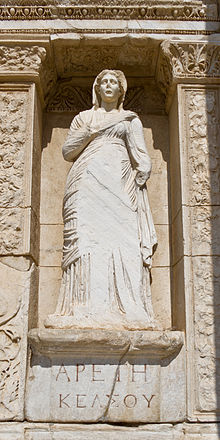아레테

아레테(고대 그리스어: ἀρετή, 영어: arete 애러티[*])는 기본적인 의미에서 "어떤 종류의 우수성"을 의미한다.[1] 이 용어는 또한 "도덕적 미덕"을 의미할 수 있다.[1] 자신의 잠재력에 부응하는 행위: 그리스어의 초기 모습에서 우수성의 개념은 궁극적으로 목적이나 기능의 성취의 개념과 함께 결합했다.
같이 보기
각주
출처
- Paideia, Vol. I, pg. 15
- Greek-English Lexicon, Liddell & Scott (1893: Oxford, Oxford University Press)
- Paideia: The Ideals of Greek Culture, Werner Jaeger, trans. Gilbert Highet (1945: New York, Oxford University Press)
- "Arete/Agathon/Kakon", G.B. Kerferd (in Paul Edwards [ed.-in-chief] The Encyclopedia of Philosophy (1967: New York, Macmillan & The Free Press)
- "Ancient Greek Athletics", By Stephen G. Miller. New Haven and London: Yale University Press, 2004
- "HOMONOIA : Goddess of Concord & Unanimity | Greek Mythology." Www.theoi.com. N.p., n.d. Web. 03 Feb. 2014.
- "Homonoia (mythology)." Wikipedia. Wikimedia Foundation, 22 June 2013. Web. 03 Feb. 2014.
- "Praxidike." Wikipedia. Wikimedia Foundation, 17 Dec. 2013. Web. 03 Feb. 2014.